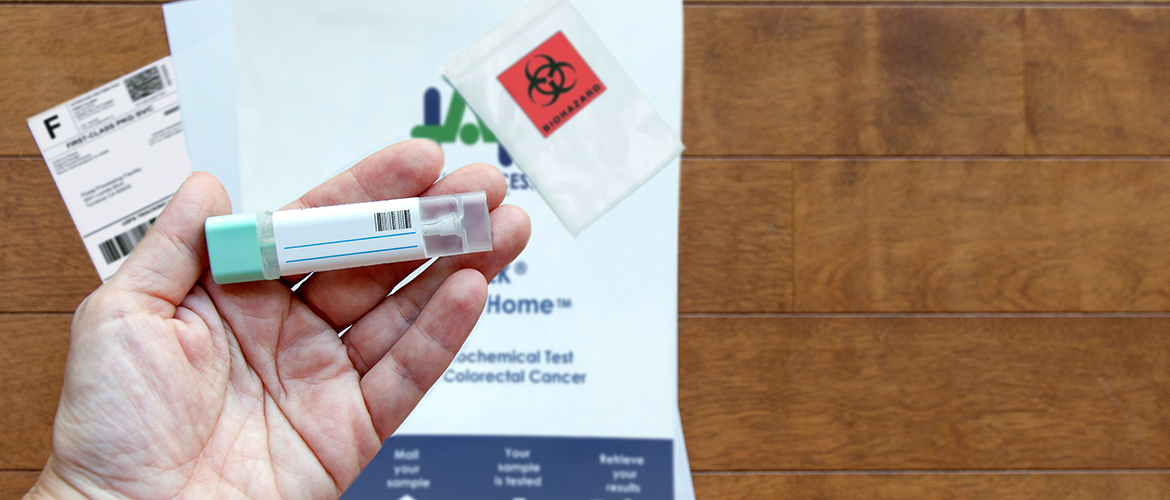Medical experts fear diagnoses of cancer may climb this year as risk of infection from the novel coronavirus deters people from getting important health screenings.
Even before the pandemic, only half of all adults in their early 50s received a recommended colorectal cancer screening test, according to the Centers for Disease Control and Prevention.
A home screening initiative by Health Care Service Corporation has the potential to reach thousands of members who may not otherwise get screened for colorectal cancer this year because of disruption caused by the pandemic.
More than 26,000 eligible members in Illinois, Montana, New Mexico, Oklahoma and Texas soon will receive a free home test, a fecal immunochemical test (FIT), to screen themselves for colorectal cancer.
The FIT kits are mailed each year to members of individual and family plans who are at least 50 years old and have not had a colonoscopy.
Home screening tests could substantially reduce the number of people who need to schedule an in-person visit for a colonoscopy during the pandemic, two cancer experts wrote in a recent article in the Lancet.
That’s important because many people who are in the age group for the recommended screenings also have underlying health conditions that put them at higher risk of severe illness from COVID-19, says Hala Ibrahim, director of enterprise quality reporting for HCSC. “So, they don’t want to go to a facility for a colonoscopy and get exposed to the coronavirus,” Ibrahim says.
This year, the quality reporting team, led by Dr. Stephanie Vomvouras, vice president and chief medical officer of quality and accreditation, also is planning a pilot program targeting members diagnosed with diabetes. Eligible members in all states will receive kits allowing them to submit blood and urine samples from home for lab tests that ensure their condition is under control.
In both cases, the results are shared only with the members and the primary care provider they identify.
Members value free screenings
The FIT kit is one of the least invasive screening tests used to find polyps or colorectal cancer — the third most commonly diagnosed cancer in the U.S. and the nation’s second leading cause of cancer-related deaths. An estimated 53,000 Americans are expected to die from colorectal cancer in 2020.
With early detection, colorectal cancer can be treated more easily. But symptoms often don’t appear until after the cancer has grown or spread when it becomes more difficult to treat.
The CDC generally recommends colorectal cancer screening for adults ages 50 to 75. About 69% of Americans in that group have been screened, according to the agency’s most recent information. But that means millions have not.
With a FIT kit, a stick or brush is used to collect a small stool sample, which is returned to a doctor or lab where the sample is checked for blood — an early sign of colorectal cancer. A colonoscopy is recommended as a follow-up test if a FIT detects blood.
The test must be repeated annually.
Since its start four years ago, the program has sent FIT kits to tens of thousands of eligible members, many of whom may not have had access to preventive care or a relationship with a primary care doctor.
“Many of these members would never have gotten screened if they hadn’t been able to do this in their own home,” says Ibrahim. More than half of members who received kits in both 2018 and 2019 returned their kits in 2019. “If you consistently target these members, they see value in it.”
Screening leads to early diagnosis and treatment
Changes to this year’s FIT kits, including better sample-collection materials and a YouTube link explaining the test, may bolster participation. The enhancements were made in response to suggestions by users surveyed last year.
“We very happy about the member feedback we received,” Ibrahim says.
Almost 75% of survey respondents cited convenience for using the test. Many said they appreciated receiving a free and noninvasive screening test they could do at home, rather than schedule and prepare for a colonoscopy.
One user said the test revealed a spouse’s early colon cancer diagnosis and treatment.
“My wife and I both had FIT tests in 2018, which led my wife to find out she had colon cancer,” the unidentified respondent said. “Without the FIT test, she probably wouldn’t have been diagnosed so quickly, treated for stage 1 (disease) and undergone surgery. Obviously, we both believe in FIT testing.”

